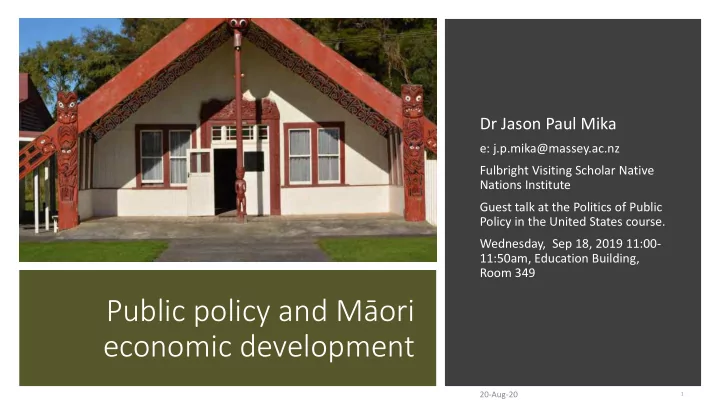

Dr Jason Paul Mika e: j.p.mika@massey.ac.nz Fulbright Visiting Scholar Native Nations Institute Guest talk at the Politics of Public Policy in the United States course. Wednesday, Sep 18, 2019 11:00- 11:50am, Education Building, Room 349 Public policy and Māori economic development 20-Aug-20 1
• Aotearoa New Zealand, its history, people and system of government • What is public policy? • What are policy priorites in New Zealand? Overview • What is Māori economic development? • Is there a role for government in Māori economic development? • Rationale for intervention: Enterprise assistance policy and programmes
Aotearoa New Zealand 20-Aug-20 3
Aotearoa New Zealand • 1250- 1350 settled by Māori • 1642 Dutch explorer Able Tasman visited • 1769 James Cook maps coastline • 1840 British and Māori sign Treaty of Waitangi • 4.79m people, GDP US$205b, HDI 0.917 (ranked 16) • 6,755 miles from Tucson - $1,500, 17 hour flight 20-Aug-20 4
New Zealand’s system of Government
House of Representatives • Mixed member proportional representation (MMP) system of electing members of parliament (MPs) from 1996 • 120 MPs in the House (71 electorate MPs, 49 ranked by party lists, with 3-year parliamentary term • Four Māori electoral seats established in 1867, increasing to five in 1996 under MMP • 29 of 120 (24%) MPs are Māori 20-Aug-20 6
Public policy Source: Victoria University of Wellington (2003) Public policy refers to the decisions and courses of action sanctioned by governments, but involve diverse stakeholders through cycle of power, politics and process (Hill, 2014). 20-Aug-20 7
Government’s priorities 1. An economy that is growing and working for all of us 2. Improving the wellbeing of New Zealanders and their families 3. Making New Zealand proud (Roy Morgan, 2018) (Ardern, 2018) Policy issues in New Zealand
Māori economic development Māori economy Māori entrepreneur Māori enterprise Māori development Identity, indigenous Identity, definition and Identity, nature, Identity, self- entrepreneurial enterprise development measurement, determination, wellbeing, capabilities development and potential, freedom growth 20-Aug-20 9
Māori people • In 2017, 734,200 Māori population • 86% of Māori live in the North Island • Median age of 24 years • 223,926 Māori in work • School completion 45% Māori (64% non - Māori) • Unemployed 10.4% Māori (4% non - Māori) • Income < $10,000, 24% Māori (18% non - Māori) • Renting: 50% Māori (28% non - Māori) • Internet access: 69% Māori (84% non - Māori) 20-Aug-20 10
Treaty of Waitangi 6 February 1840 20-Aug-20 11
• Suppression of Rebellion Act 1863 • Oyster Fisheries Act 1866 • Maori Land Settlement Act 1905 • Native Land Act 1865 • Tohunga Suppression Act 1907 • Protest movements and court action lead to increasing provision of Māori interests diminished the Treaty in law, policy and practice 20-Aug-20 12
• Settling claims • Historical claims before 21 September 1992 • Contemporary claims after 1992 • Forms of redress • Historical account • Cultural redress • Commercial redress • 73 settlements enacted, valued at NZ$2.2b (Fyers, Treaty settlements 2018) 20-Aug-20 13
• Adopted 13 September 2007 • Affirms Indigenous human rights • Enabling self-determined economic development • Indigenous management of indigenous resources • Indigenous ways of doing business • Basis for more and better enterprise assistance • Facilitates inter-indigenous Role of UN Declaration on the business and trade networks Rights of Indigenous Peoples 14 20-Aug-20
“the assets owned and income earned by Māori – including collectively- owned trusts and incorporations, Māori - owned businesses (e.g., tourism, broadcasting, and the self-employed), service providers (especially in health and education), and the housing owned by Māori [and the] wages and What is the Māori salaries earned by Māori workers.” economy? (NZIER, 2003, p. 7) 20-Aug-20 15
Te Pūnaha Hīhiko Callaghan Inovation 20-Aug-20 Māori economic development He kai kei aku ringa: Erere policy Living Standards: 4 Capitals
National strategy: He kai kei aku ringa 20-Aug-20 17
“the vision of iwi, hapū and whānau for a future where economic growth can be realised as a conduit to the sustainability and wellbeing of whānau, lands, waterways, marae, language and future generations” Sir Mason Durie An intergenerational strategy for Māori economic development 20-Aug-20 18
Māori enterprises 20-Aug-20 19
A Māori entrepreneur is a person who identifies as Māori and engages in entrepreneurial activity according to a Māori world view, but integrates within this, elements of a Western world view. Māori entrepreneurship 20-Aug-20 20
• Political ideology Is there a role • Non-neutral (hands-on) policy for • Neutral (hands-off) policy government • Private-public good elements in Māori • Policy intervention • Evidence of market failure economic • Benefits outweigh costs development? • Evidence intervention will work
Why Indigenous policy matters? 20-Aug-20 22
Three roles of enterprise assistance in Māori entrepreneurship: • Satisfy firm-level business needs • Build Māori entrepreneurial capabilities • Enable Māori enterprises to develop Enterprise assistance 20-Aug-20 23
1. Design principles Rationale 1. Independence 5. Efficacy 2. Design 2. Adaptability 3. Multiplicity 4. Customisation 5. Authenticity 6. Public-private 7. Validation 8. Subsidisation 9. Longtermism 10. Social economy 4. Process 3. Content 11. Specialisation 12. Learning
Discussion 25 20-Aug-20
Recommend
More recommend